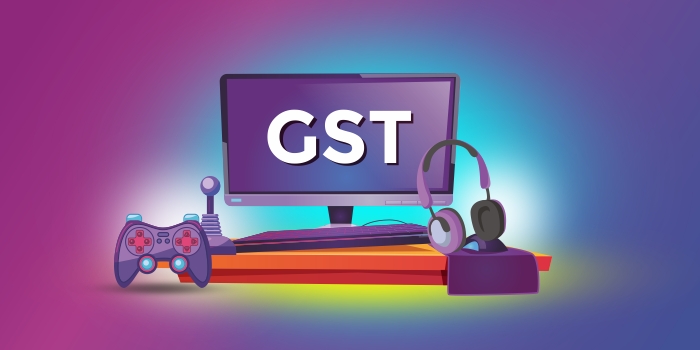A final decision on GST to be paid by casinos, online gaming companies, and those in horse racing is expected to be announced on 10 August 2022.
At present, skill-based online games are taxed at 18pc GST and online games involving betting and gambling are levied 28pc. Following multiple rounds of deliberations, the government is expected to impose a 28pc GST on gross gaming revenue for online gaming and casinos as well.
Medianews4u.com spoke with gaming companies to understand how the GST hike will impact the gaming sector’s ad spends, prize pools and smaller players.

Ankur Singh, CEO and Founder, Witzeal Technologies, says that the prize pool would decrease substantially, thereby discouraging users to participate in gaming and leading to a decrease in taxes to be paid over the years.
He adds that game producers, platform operators, and advertisers will be the most affected by the implementation of a 28pc GST in online gaming since a significant amount of revenue will be used to pay the GST. “A higher tax rate will limit gaming companies’ spending on marketing and advertising, which might stifle the sector and have an impact on gamers, gaming influencers, and the larger gaming ecosystem,” explains Singh.

Gaurav Gaggar, Director, Poker High has a similar view. He says, “Certainly, it will impact the spends available to gaming companies, and less marketing money will be spent on all media. India has a unique position to be a world leader in skill-based gaming and this will slow its progress.”
Gaggar observes that gaming companies guarantee prize pools to players, which will become more difficult.

Mitesh Gangar, Co-Founder and Director of PlayerzPot, believes that gaming companies will continue to invest in marketing and advertising campaigns in order to reach their target audience.
He adds, “The decision to levy a 28pc tax on gross gaming revenue may affect the gaming companies’ revenues, but the advertising costs won’t be affected as much. Companies will learn to balance their resources to retain their audience, like by increasing the cost of their in-app advertisements.”

Yash Pariani, Founder and CEO House of Gaming, also believes that gaming events won’t restrict their ad budgets as a decent promotional campaign is the driving force behind any successful esport event.
Will TV spends be the most hit?
“When it comes to TV spends, it will be completely dependent on the brands and their reach in the market. So, we can assume that companies with larger revenues will continue spending on TV ads. However, the small gaming companies may be affected as they might not be able to manage their expenses to make huge marketing expenditures,” says Gangar.

Businesses will still spend money to tap the target audience, observes Bhavesh Talreja, Founder, Globale Media. “However, its actual impact on TV spends is uncertain as it is one of the fastest-growing industries in India,” he adds.
Can new entrants into an already crowded space afford to spend less?
“Higher GST prices may deter new entrants as operating costs would escalate, and with limited marketing budgets, it will be difficult to attract users to the platform or acquire enough purchasers for the games being developed. Users would have fewer options as a result, and this would in part inhibit innovation and restrict the sector’s ability to grow,” observes Singh.
“The Indian online gaming industry is valued at over $300 billion and is attracting global investment. And yes, it is indeed a competitive space. We believe that the new entrants must focus on reaching their target audience through strategic moves without thinking much about expenses,” says Gangar.
According to him, the coming years will see how companies come up with strategies to maximise revenues without compromising marketing budgets.
“As the market is captured by the few existing stalwarts with huge prize pools, it might be a little tough for the new entrants,” observes Pariani. But he adds that with strategic brand building and collaborations, they too might soon find a place on the map.

Ishan Verma, Founder and Director, Chemin Esports, says the decision won’t have a significant effect on new entrants because it will create a legal and regulatory framework that all businesses must follow. Hence, boosting the industry’s growth rather than slowing it down.
On the other hand, Gaggar observes that new companies will find it even more difficult to operate with smaller budgets. “Clearly, the bigger companies will be able to stay afloat while smaller players will find it going tough. Small companies need to spend on advertising and guaranteed prize pools to establish credibility and reach a critical player pool mass, which will become even more difficult,” he adds.
Could this impact the prize purse and, hence, make it less attractive?
“Prize money isn’t always the only incentive for gamers. People play games because they get thrilled and engaged by them on multiple levels. To not be able to play at all might be an extremely bitter pill for one to swallow. The feeling of community and competitiveness among the player base is what keeps them connected with the game. We believe that a lower grand prize will not make online gaming any less attractive,” says Gangar.
“A jump from 18pc to 28pc GST on online gaming, that too on the entire amount which the player deposits for a game, may drive potential players away from tax-paying portals to illicit websites as they would offer a considerable reduction in the prize money available for distribution. It could certainly impact the business of these tax-paying platforms in the long run,” says Talreja.
“This move will directly bite into the prize pool and make it less attractive for players,” notes Gaggar.

















